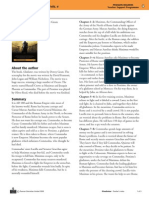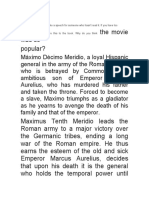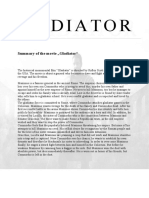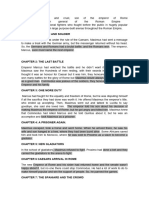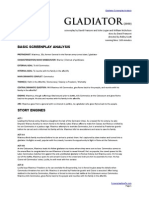Gladiator Essay
Gladiator Essay
Uploaded by
api-272198292Copyright:
Available Formats
Gladiator Essay
Gladiator Essay
Uploaded by
api-272198292Original Title
Copyright
Available Formats
Share this document
Did you find this document useful?
Is this content inappropriate?
Copyright:
Available Formats
Gladiator Essay
Gladiator Essay
Uploaded by
api-272198292Copyright:
Available Formats
Wattel 1
Kevin Wattel
John Malizia
FILM 1003: Film Genres War
Nov. 28, 2014
Masculinity portrayed in Gladiator
Ultimately, were all dead men. Sadly we cant choose how, but we can decide
how we meet that end, in order that we are remembered as men (Proximo). From
commanding thousands to being thrown into the pit of slaves to prevailing in the great
Coliseum in Rome, Russell Crowes character, Aelius Maximus Decimus Meridius,
shows his masculinity in the film, Gladiator, over and over again. On the other hand,
Commodus, played by Joaquin Phoenix does not show masculinity by being disowned
by his father, delighting in watching death in the Coliseum and ultimately killed by
Maximus despite cheating in the fight. Maximus shows Masculinity whereas Commodus
does not in the opening of the movie in Germania, the Coliseum and in the final fight
between the two.
Maximus is the commander of Romes army in the North and General over the
Felix Legions. He has won many battles for Rome. As Maximus walks past the
regiments of his soldiers the men bow their heads and greet him. Smiles are on the
faces of the men who soon will go into battle because they know that Maximus whom
they respect and follow will be leading them. After the victorious battle, Maximus is
approached by the Emperor, Marcus Aurelius, and commended for his valour once
again in the field of battle. As the two walk back to the road the audience hears the
sound of cheering soldiers. Maximus states that the men honour their Caesar but
Wattel 2
Marcus declares that it is Maximus who is being honoured by the men. It is that night
that Marcus announces to Maximus that it is he who Marcus wishes to take over the
throne and lead Rome and not Marcus son, Commodus. Over and over again,
Maximus is shown to have the aspects of masculinity and the ideal man that men
should seek to be by the way his men view him and how he is held in high esteem by
the Emperor of Rome.
The viewer first meets Commodus when he and his sister are going to Germania
to meet their father. When Commodus does not find his father at the camp, he rides to
the front lines to greet his father. When he sees and approaches his father, Commodus
yells out to him saying, Have I missed it, have I missed the Battle? All Marcus has to
say to his son is You have missed the war. Even Marcus does not he regard his son
as heroic or valiant but instead portrays him as a man who cowers from Battle. Later
that night when Commodus is alone with his Marcus, Marcus announces to his son that
he will not be inheriting the thrown. Commodus breaks down in tears and begs to his
father to reconsider. Even in the dialogue between the two, Commodus confesses that
all the Masculine attributes that Marcus was trying to find in his successor were absent
from Commodus. Even in the beginning of the film the viewer can already see that
Commodus shows very little sign of masculinity whereas Maximus is portrayed with
many masculine features and is clearly the ideal man that the viewer should seek to be
like.
After avoiding the execution brought down on his head by Commodus and being
thrown into the pits of slaves, Maximus finds himself fighting for his life in the gladiator
Wattel 3
ring. After winning the hearts of the men in Zucchabar, he is drafted to go to Rome and
fight in the Coliseum. Whenever Maximus entered the Coliseum he was shown to be
victorious and winning the favour of the crowds. Maximus, however, does not find
pleasure in killing. He befriends and leads the men he fights with on to victory for one
purpose, to have vengeance on Commodus who killed his wife and child. After his first
victory in Rome, Commodus commands to see his face and know his name. Maximus
turns away from him at first and after more urging he reveals his face and angrily
speaks to Commodus saying My name is Maximus Decimus Meridius, commander of
the Armies of the North, General of the Felix Legions, loyal servant to the true emperor,
Marcus Aurelius. Father to a murdered son, husband to a murdered wife. And I will have
my vengeance, in this life or the next. Maximus shows attributes of Masculinity here by
defending his family expressing the corruption of Commodus.
Upon killing his own father to gain the crown of Rome, Commodus announces
that there will be many games held in the Coliseum. In doing this, Commodus shows his
desire for blood to be shed as a form of entertainment. Further, when Commodus
watches the games, he is shown laughing and licking his lips in a sick, twisted portrayal
of his approval for all the bloodshed. When Maximus goes against the champion of
Rome, he enters the stadium with crowds cheering. With envy and hatred towards
Maximus, Commodus tells his sister that no matter what the outcome of the battle may
be, it will not matter. Commodus has already arranged for Maximus death. Finally, after
Maximus fight, Commodus goes down to see him to demand why Maximus disobeyed
his order to kill the defeated man. When Maximus turns away Commodus goes on how
killing Maximus son and wife were of great joy to him. Trembling with anger, Maximus
Wattel 4
utters these words, The time for honouring yourself will soon come to an end,
Highness.
A final plan to free Maximus and bring him back to his army was destroyed when
Commodus caught word of it. Maximus was beaten and placed in chains when
Commodus arrived at the coliseum to see him. In this confrontation Maximus once
again laughs at the taunts of the emperor who challenges him in a one on one fight. In
the background the crowd cheers Maximus name. Commodus leans into Maximus and
stabs him in the back and commands the guards to put on the armor and conceal the
wound. Even here, Commodus shows cowardice and clearly shows his faults in true
masculinity as he cannot even fight a fair fight. As the fight goes on, Commodus loses
his sword. After crying out for a sword, no one would give him one because they have
no respect for him. While Maximus drops his sword thinking the fight was over,
Commodus takes advantage of this and revealed a dagger with which he tried to kill
Maximus but ultimately gets stabbed to death with by Maximus. As the crowd was still,
Maximus stood and commanded that the army and his fellow prisoners be released. He
then fell to ground with a smile on his face for he was going to see his family once
again. Here the audiences sees that even as a death approaches, Maximus takes care
of his men. When the prison men come out to the grounds where Maximus and
Commodus bodies lay, Commodus sister speaks to the men saying He (Maximus)
was a soldier of Rome, honour him. Here even Commodus sister ignores the death of
her cowardice brother and honours the death of this great man Maximus. Leaving
Commodus in the dust, the men carry their hero and liberator into the air and carry him
Wattel 5
out as a last sign of respect for this man who truly showed the characteristics of a
masculinity.
From highest commander, to lowest slave, to highest gladiator and victor of
Rome, Maximus Decimus Meridius shows true masculinity in the way he leads, fights
and conquers his ultimate foe. On the other hand, Commodus does not show any trace
of masculinity through his cowardice in battle, in killing his father and taking the thrown,
to gloating in the coliseum which ultimately leads to his justified death. Throughout the
film, the viewer can clearly see that Maximus has the true traits of masculinity whereas
Commodus falls disgracefully short.
Wattel 6
Works Cited
Gladiator. Dir. Ridely Scott. Perf. Russel Crowe. Shepperton Studios, 2000. DVD.
You might also like
- Deep SongDocument1 pageDeep SongDavide PalladinNo ratings yet
- Gladiator ANALYSIS 3 Act StructureDocument7 pagesGladiator ANALYSIS 3 Act StructureSquilliamNo ratings yet
- GladiatorDocument3 pagesGladiatorJ Miguel Remuzgo100% (1)
- Gladiator Movie WORKSHEETDocument2 pagesGladiator Movie WORKSHEETBernoli100% (1)
- GladiatorDocument1 pageGladiatorPedro Pablo Rojas RamosNo ratings yet
- 1) Based On The Book, Make A Speech For Someone Who Hasn't Read It. If You Have Too Seen The Movie, Compare This To The Book. Why Do You ThinkDocument6 pages1) Based On The Book, Make A Speech For Someone Who Hasn't Read It. If You Have Too Seen The Movie, Compare This To The Book. Why Do You ThinkAna María Herrera ZNo ratings yet
- GladiatorDocument5 pagesGladiatorCarolina OrtizNo ratings yet
- Gladiator: Summary of The Movie Gladiator"Document1 pageGladiator: Summary of The Movie Gladiator"Jo O ConnorNo ratings yet
- Review of The Movie GladiatorDocument3 pagesReview of The Movie GladiatorPalomaGonzalezNo ratings yet
- TriangleDocument1 pageTriangleapi-242976291No ratings yet
- GladiatorDocument1 pageGladiatorRohith KumarNo ratings yet
- GLADIATOR SummaryDocument2 pagesGLADIATOR SummaryFer FuentesNo ratings yet
- Gladiator Script AnalysisDocument17 pagesGladiator Script AnalysissimpliciusNo ratings yet
- TN GladiatorDocument3 pagesTN GladiatorJoane MassaNo ratings yet
- Gladiator's SummaryDocument1 pageGladiator's SummaryTheBossOnestNo ratings yet
- GladiatorDocument30 pagesGladiatorsimpliciusNo ratings yet
- Fa FinalDocument5 pagesFa Finalapi-273178015No ratings yet
- The Real Gladiator: The True Story of Maximus Decimus MeridiusFrom EverandThe Real Gladiator: The True Story of Maximus Decimus MeridiusNo ratings yet
- GladiatorDocument4 pagesGladiatorrabie alsoudiNo ratings yet
- Gladiator DialoguesDocument9 pagesGladiator Dialoguesarjun vijay100% (4)
- Gladiator Script AnalysisDocument17 pagesGladiator Script AnalysisAlok nrNo ratings yet
- Film Review - The GladiatorDocument4 pagesFilm Review - The Gladiatorapi-246741246No ratings yet
- GLADIATORDocument1 pageGLADIATORChristopher NúñezNo ratings yet
- RACACHO - Lit Crit - Activity 1Document3 pagesRACACHO - Lit Crit - Activity 1Maegan RacachoNo ratings yet
- SummaryDocument2 pagesSummaryd246hvymv4No ratings yet
- Script GladiatorDocument1 pageScript GladiatorLuiz BezerraNo ratings yet
- текст к гладиаторуDocument2 pagesтекст к гладиаторуEruviel LinNo ratings yet
- Hector Castillo Film ReviewDocument3 pagesHector Castillo Film Reviewapi-233262165No ratings yet
- El Gladiador EnsayoDocument6 pagesEl Gladiador EnsayoKarlie YopqNo ratings yet
- Individual Behaviour On GladiatorDocument3 pagesIndividual Behaviour On GladiatorUmer ManzoorNo ratings yet
- Maximus Decimus MeridiusDocument2 pagesMaximus Decimus MeridiuskensellNo ratings yet
- Gladiator Lessons On Manliness - The Art of ManlinessDocument12 pagesGladiator Lessons On Manliness - The Art of ManlinessIndie BotNo ratings yet
- Gladiator: Directed by Ridley Scott and Released On May 5 2000Document4 pagesGladiator: Directed by Ridley Scott and Released On May 5 2000eduardo199119No ratings yet
- English Termp Paper 2 12-20-17Document3 pagesEnglish Termp Paper 2 12-20-17api-346274088No ratings yet
- The Battle in Germania Against The Barbarians Was An Action As A Part of EmperorDocument28 pagesThe Battle in Germania Against The Barbarians Was An Action As A Part of EmperorHi I'm MiloNo ratings yet
- Gladiator Movie ThesisDocument7 pagesGladiator Movie Thesisheidimaestassaltlakecity100% (2)
- What Makes An EpicDocument3 pagesWhat Makes An EpicstefanalessandroyNo ratings yet
- Espe Language Department NAME: Jhon Villarreal LEVEL: Fridays, VIII FILM REVIEW: GladiatorDocument1 pageEspe Language Department NAME: Jhon Villarreal LEVEL: Fridays, VIII FILM REVIEW: GladiatorJhon VillarrealNo ratings yet
- Actividades-Gladiator InglésDocument6 pagesActividades-Gladiator InglésPaz Peña César EduardoNo ratings yet
- Tsu Ying Assignment AnswersDocument4 pagesTsu Ying Assignment AnswerssargunanathanNo ratings yet
- Gladiator Fact or FictionDocument2 pagesGladiator Fact or FictionMatyáš BajgarNo ratings yet
- GLADIATOR (Questions) Chapter 1-Farmer and SoldierDocument16 pagesGLADIATOR (Questions) Chapter 1-Farmer and Soldieranacaceres68No ratings yet
- Dewey Gram (Gladiator)Document3 pagesDewey Gram (Gladiator)AssignmentLab.com0% (1)
- Alexandra's Part of The ProjectDocument13 pagesAlexandra's Part of The ProjectalexNo ratings yet
- Maximus The Sword GamecockDocument5 pagesMaximus The Sword GamecockErick FathoniNo ratings yet
- CoriolanusDocument2 pagesCoriolanusBruce DownieNo ratings yet
- Dewey Gram "Gladiator"Document3 pagesDewey Gram "Gladiator"AssignmentLab.com0% (1)
- MacbethessaycameronholmesDocument3 pagesMacbethessaycameronholmesapi-355725910No ratings yet
- POMPEII: Major Aspects: SettingsDocument6 pagesPOMPEII: Major Aspects: SettingsAngela JaNo ratings yet
- Gladiator - The Real StoryDocument5 pagesGladiator - The Real StorySubramanyam SettyNo ratings yet
- Breif Analysis of The Character of MacbethDocument1 pageBreif Analysis of The Character of MacbethSamuel BaughNo ratings yet
- Gladiator Presentation 2Document8 pagesGladiator Presentation 2yassergorfti16No ratings yet
- The Drums of Chaos: Simon of Gitta Chronicles, #2From EverandThe Drums of Chaos: Simon of Gitta Chronicles, #2Rating: 4.5 out of 5 stars4.5/5 (4)
- Julius Caesar Introduction, Character PredictionsDocument15 pagesJulius Caesar Introduction, Character Predictionsmarinel01No ratings yet
- Seven Virtues of Gladiator LeadershipDocument12 pagesSeven Virtues of Gladiator LeadershipshohinidasNo ratings yet
- Gladiator 2000Document121 pagesGladiator 2000begüm çelebiNo ratings yet
- Macbethsummary: Act 5, Scenes 1 - 11Document5 pagesMacbethsummary: Act 5, Scenes 1 - 11kyoNo ratings yet
- Harper LeeDocument7 pagesHarper LeeFigigoNo ratings yet
- Visteon LabSlotDocument6 pagesVisteon LabSlot727821TUCS216 SANJAY S.No ratings yet
- Sholay The Making Of A Classic (Anupama Chopra)Document151 pagesSholay The Making Of A Classic (Anupama Chopra)Mash HNo ratings yet
- PANDORA (PANDORA) - YouTubeDocument1 pagePANDORA (PANDORA) - YouTubeDR KayaSNo ratings yet
- Grade 1: 0. RepertoireDocument2 pagesGrade 1: 0. RepertoireLorena Do ValNo ratings yet
- 2019 2020 Day EveDocument524 pages2019 2020 Day EveaskmarthikNo ratings yet
- Les Films Du PoissonDocument3 pagesLes Films Du PoissonRemi DrigoNo ratings yet
- MAI-102_2023-24_Spring-2 (2)Document32 pagesMAI-102_2023-24_Spring-2 (2)anujsNo ratings yet
- 22.+ar SDocument119 pages22.+ar SSamanth KedamNo ratings yet
- CSP VIVA Schedule Final 17-07-2022Document15 pagesCSP VIVA Schedule Final 17-07-2022chinnu varmaNo ratings yet
- IpoDocument135 pagesIpoLuis BretonNo ratings yet
- BCOM 1st Sem DetailDocument689 pagesBCOM 1st Sem DetailMoni BudhirajaNo ratings yet
- Student Name 2016-17-Sept 6Document15 pagesStudent Name 2016-17-Sept 6Ramesh Kumar YadavNo ratings yet
- Saldyanto Arham J011181304: A Synopsis of The Film Stand by Me DoraemonDocument6 pagesSaldyanto Arham J011181304: A Synopsis of The Film Stand by Me DoraemonFilm 2018No ratings yet
- Game of Thrones S2E01Document34 pagesGame of Thrones S2E01DaemuseNo ratings yet
- SsssDocument33 pagesSsssSWAPNILNo ratings yet
- Candidate Data 2Document9 pagesCandidate Data 2sonig35423No ratings yet
- True Eastern Music MainDocument39 pagesTrue Eastern Music Mainapi-104794694No ratings yet
- Kiara Advani - WikipediaDocument1 pageKiara Advani - Wikipediaignisignis265No ratings yet
- Jain Social GroupDocument41 pagesJain Social Grouprajeevpareek10514No ratings yet
- List of ObitauriesDocument40 pagesList of Obitauriesrobins chickuNo ratings yet
- 100 Great CharactersDocument16 pages100 Great CharacterskumarNo ratings yet
- LDC FinalDocument318 pagesLDC FinalMeenakshi HandaNo ratings yet
- Name ListDocument18 pagesName ListblushingbewksNo ratings yet
- Facebook 28Document1 pageFacebook 28apshar medNo ratings yet
- HOTSPOT 04-01-2022: SR. NO - Name Age Gender Mobile Address District StatusDocument3 pagesHOTSPOT 04-01-2022: SR. NO - Name Age Gender Mobile Address District StatusROHIT NANDANNo ratings yet
- BFGaultney IndexDocument40 pagesBFGaultney IndexHBurnham3422No ratings yet
- HUM3052 Assignment-20 MarksDocument3 pagesHUM3052 Assignment-20 MarksHenryNo ratings yet


